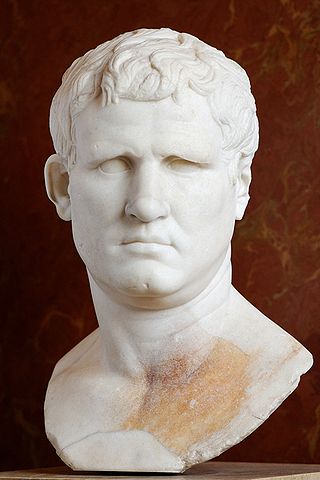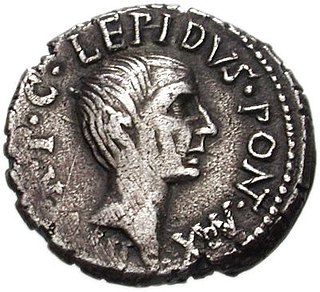Related Research Articles

Marcus Vipsanius Agrippa was a Roman general, statesman and architect who was a close friend, son-in-law and lieutenant to the Roman emperor Augustus. Agrippa is well known for his important military victories, notably the Battle of Actium in 31 BC against the forces of Mark Antony and Cleopatra. He was also responsible for the construction of some of the most notable buildings of his era, including the original Pantheon.

Marcus Antonius, commonly known in English as Mark Antony, was a Roman politician and general who played a critical role in the transformation of the Roman Republic from a constitutional republic into the autocratic Roman Empire.
This article concerns the period 39 BC – 30 BC.

This article concerns the period 49 BC – 40 BC.
Year 40 BC was either a common year starting on Thursday, Friday or Saturday or a leap year starting on Thursday or Friday of the Julian calendar and a common year starting on Friday of the Proleptic Julian calendar. At the time, it was known as the Year of the Consulship of Calvinus and Pollio. The denomination 40 BC for this year has been used since the early medieval period, when the Anno Domini calendar era became the prevalent method in Europe for naming years.

Marcus Aemilius Lepidus was a Roman general and statesman who formed the Second Triumvirate alongside Octavian and Mark Antony during the final years of the Roman Republic. Lepidus had previously been a close ally of Julius Caesar. He was also the last pontifex maximus before the Roman Empire, and (presumably) the last interrex and magister equitum to hold military command.

Sextus Pompeius Magnus Pius, also known in English as Sextus Pompey, was a Roman military leader who, throughout his life, upheld the cause of his father, Pompey the Great, against Julius Caesar and his supporters during the last civil wars of the Roman Republic.

Gnaeus Pompeius Magnus was a Roman politician and general from the late Republic.
Mucia Tertia was a Roman matrona who lived in the 1st century BC. She was the daughter of Quintus Mucius Scaevola, the pontifex maximus and consul in 95 BC.

The gens Aemilia, originally written Aimilia, was one of the greatest patrician families at ancient Rome. The gens was of great antiquity, and claimed descent from Numa Pompilius, the second King of Rome. Its members held the highest offices of the state, from the early decades of the Republic to imperial times. The Aemilii were almost certainly one of the gentes maiores, the most important of the patrician families. Their name was associated with three major roads, an administrative region of Italy, and the Basilica Aemilia at Rome.
Lucius Marcius Philippus was a politician and senator in the late Roman republic. He was governor of Syria from 61 to 60 and later served in the consulship of 56 BC. He was also step-father of the emperor Augustus.
The naval Battle of Naulochus was fought on 3 September 36 BC between the fleets of Sextus Pompeius and Marcus Vipsanius Agrippa, off Naulochus, Sicily. The victory of Agrippa, admiral of Octavian, marked the end of the Pompeian resistance to the Second Triumvirate.
Marcus Aemilius Scaurus was a Roman politician of the 1st century BC and son of Marcus Aemilius Scaurus and Caecilia Metella.

The Bellum Siculum was an Ancient Roman civil war waged between 42 BC and 36 BC by the forces of the Second Triumvirate and Sextus Pompey, the last surviving son of Pompey the Great and the last leader of the Optimate faction. The war consisted of mostly a number of naval engagements throughout the Mediterranean Sea and a land campaign primarily in Sicily that eventually ended in a victory for the Triumvirate and Sextus Pompey's death. The conflict is notable as the last stand of any organised opposition to the Triumvirate.
Pompeia Magna was the daughter and second child born to Roman triumvir Pompey the Great from his third marriage, to Mucia Tertia. Her elder brother was Gnaeus Pompeius and her younger brother was Sextus Pompey.
Marcus Titius was a Roman politician and commander at the end of the Roman Republic.
Marcus Scaurus may refer to:
Lucius Scribonius Libo was a Roman politician and military commander who was consul in 34 BC and brother-in-law to the future emperor Augustus. Libo rose to prominence through his connections with Pompey. When Julius Caesar rebelled against the Roman Senate in 49 BC, Libo sided with Pompey. He carried out a variety of military, diplomatic and naval roles, with mixed success.

The first-century-BCE Roman statesman and commander Pompey the Great was married five times. These marriages were not only romantic matches, but political arrangements, often dictated by Pompey's political career and need to form alliances with other powerful Roman men.
References
- William Smith and Charles Anthon A New Classical Dictionary of Greek and Roman Biography, Mythology and Geography V2